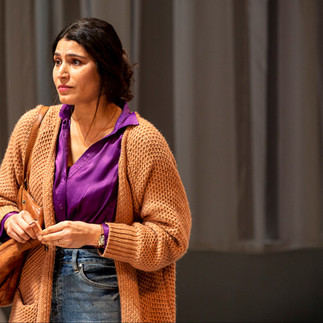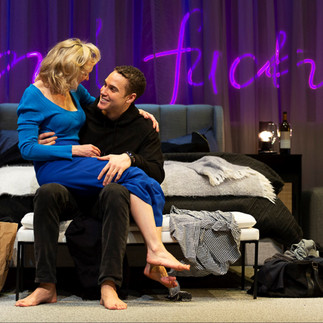Review: Anna K at Malthouse
- Theatre Travels

- Aug 21, 2022
- 3 min read
Review by Stephanie Lee
Set in a hotel room, Anna K is the story of media journalist Anna’s fall from power after a backlash online once her affair with much younger man Lexi is uncovered. Similar to a loungeroom drama, the action unfolds in almost real time slowly feeding the audience information about what is happening outside of the room. There are phone calls with work and family, tv snippets, tweets, and even visits from Anna’s friends, all attacking Anna from the “safety” of the hotel room.
Heavily inspired by Tolstoy’s Anna Karenina, Anna K refocuses the well-known story from Anna’s perspective, in order to explore the impact of public shame on women who are bombarded by it. The play written by Suzie Miller, who most recently has received great acclaim for Prima Facie, asks why powerful women’s private lives are often weaponised against them in relation to their careers. It particularly exposes the gendered and hurtful language used by online users in cases of high-profile women like Anna doing something deemed ‘unfaithful’ like having an affair.
While it is important to acknowledge that there has been a history of women being held to a different standard than men in the public eye, in 2022 a feminist piece that fails to engage with intersectionality at all feels a little untimely. Especially a play dealing with the public downfall of powerful women who act out of the prescribed societal norm. Miller’s text unfortunately feels like the most restricting factor of this production, unable to quite make the impact it set out to. Some of the messaging feels outdated and almost over-simplified with complexity blaringly lacking from the conversation.
The performances by Callan Colley (Lexi), Caroline Craig (Anna) and Louisa Mignone (Anna’s friend/s) were quite dynamic, managing the quick shifts in the play as best they could. However, the connection between Anna and Lexi unfortunately felt missing, creating a dissonance between what was being said and what was being seen. The lack of chemistry might have been a little to do with the play’s uneven weighting of character focus, as an over-concentration on Anna detrimentally impacted Lexi’s character development.
The highlight of the piece were the set and lighting designs, as the imagery created by the two of them was superb. The set design by Anna Cordingley was beautifully detailed, confining the Merlyn stage to an intimate one room space. The consistent grey undertones both created a modern feel but also reflected the confinement of space, which trapped Anna throughout the play.
Lighting by Paul Jackson helped transition scenes in a stylistically interesting way, condensing time thorough a movement between different hues of light. The lighting of the curtains in particular created visually arresting imagery, almost fantastical yet incredibly lifelike in nature.
Similarly, sound by Joe Paradise Lui assisted in moving the drama from scene to scene sonically reflecting the ominous sense of unravelling. A rattle of trains could also often be heard, a nice ode to the original Tolstoy text.
Director Clarissa Licciardello created a constrained, visually interesting piece of work, however, it felt limited by the dialogue of the text. In particular, the leaps between states of emotion heading towards Anna’s final monologue could not be effectively bridged and left the audience inevitably distanced from the emotional core of the text.
Although the idea of the play itself is interesting, looking at women in the public eye and social media’s all-pervasive effect in 2022, much of the play’s exploration felt under-examined and a little unconvincing.
Overall, Anna K has some beautifully theatrical moments and provides an interesting provocation even if it slightly misses the mark.
Image Credit: Pia Johnson
















